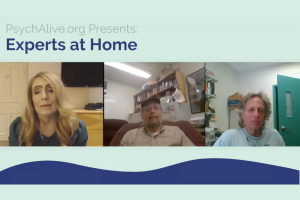Comforting Those Who Grieve

So many people get stuck when it comes to comforting someone who is grieving. They don’t know what to say. They don’t know what to do. So they send flowers, they bring over a casserole for the already filled-to-the-brim freezer, they send a sweet card, or they sometimes just avoid the issue entirely, thinking maybe it will just go away. Some people even go away.
Almost immediately after my son Paul’s funeral, people began to disappear. Perhaps they were threatened or couldn’t face the realities of my life. Maybe my loss and grief brought too many reminders of the losses and grief in their own lives. Maybe they thought what I had just experienced was contagious.
For someone who is grieving, any kind of human contact and kindness helps; on the other hand, avoidance and disappearance hurts.
A death by suicide makes the situation even more touchy, because people don’t even like to say that word out load. My own mother couldn’t say the word “suicide” after my son took his life. When people asked her what happened, all she could say was, “something terrible.” And she criticized me for being so open when she heard me telling friends any of the details. Her behavior during the early months after my son’s death was more a hindrance than a comfort to me.
Ironically, my greatest comfort after our son’s death came from my next-door neighbor Patty. My husband and I had had her family over for dinner when they moved into their house, and we had gone out to dinner with her and her husband once in a while, but she and I were just a bit more than cool acquaintances.
I had always found her too loud – I could hear her yelling at her stepson and son through both our exterior walls. And I thought she was too nosy – she always seemed to poke her nose outside whenever I was in the garden. She was just too domineering and much too pushy for my taste. I couldn’t believe her chutzpah when she appeared at our door with her oldest daughter and a six-pack of beer as soon as she found out we had two young, handsome, male houseguests – my nephew and his friend – staying with us for a few weeks. That was the end of my tolerance – for a while.
After Paul died, Patty really came through. She offered to put up our out-of-town relatives, she brought over bagels and cream cheese in the mornings, while we had hordes of people in and out of our house, and she supplied the coffee for the open house after the funeral. She was just there in a very quiet nonintrusive way – a way that I had never seen in her before. And, thankfully, the word “suicide” didn’t make her back off.
Just before our first Thanksgiving without Paul, Patty left a basket on my doorstep. The note she wrote said that following her mother’ death she had dreaded the holidays, so she hoped these few items would ease the holiday season for me. As I read her note and looked through the basket, I cried, not only from the sadness of not having Paul with us on Thanksgiving, Hanukah, and his New Year’s Eve birthday, but from the generosity and caring being offered me by a person I hardly knew and had never liked very much. In such a quiet and unassuming way, she showed me real human compassion and understanding. And most important to me at that time, she never asked me a lot of questions or intruded on my privacy. She just let me know she was there if I needed her.
Among the items in the basket – each one separately wrapped – was a poetry book about coping with the loss of a love, and that was the first book after Paul’s death that I managed to read. There was also a journal, a sweet smelling candle, a box of delicious chocolate covered graham crackers, and a smooth gray stone.
This stone became my biggest comfort. Just large enough to fit in the palm of my hand, it feels the perfect size when I close my hand around it. One edge is round and the other is triangular. One side is plain; the other has the word “son” carved into it. Right after Patty left the basket on my doorstep, this little stone became my friend.
I took it to bed with me. Once settled, I placed it on my chest just between my breasts. I liked its coldness on my heart. It helped me relax. Holding it in my hand and reading the word with my thumb also helped. I carried it around in my pocket for a while during the day just to feel it close to me. And then, I began to wonder about my own sanity. Was I trying to exchange my son for a stone?
When I began to feel better, I let go of it and let it rest on another item from that basket – a little, silk-covered, lavender sachet pillow with butterflies and the word “heal” painted on the silk. These two gifts from Patty are still there on my bedside table after all these years.
I’m sorry to say, Patty died this year after a two-and-a-half year battle with pancreatic cancer. Now I miss hearing her voice from the other side of our fence. I miss seeing her out in her garden from my office window. I’ll always remember her kindness and understanding at my greatest time of need.
 Madeline Sharples has worked most of her life as a technical writer and editor, grant writer, and proposal manager. She fell in love with poetry and creative writing in grade school and decided to fulfill her dreams of being a professional writer later in her life. Madeline is the author of Leaving the Hall Light On, a memoir about how she and her family survived her older son’s suicide, which resulted from his long struggle with bipolar disorder. She and her husband of 40 years live in Manhattan Beach, CA. Click Here to read more about Madeline Sharples
Madeline Sharples has worked most of her life as a technical writer and editor, grant writer, and proposal manager. She fell in love with poetry and creative writing in grade school and decided to fulfill her dreams of being a professional writer later in her life. Madeline is the author of Leaving the Hall Light On, a memoir about how she and her family survived her older son’s suicide, which resulted from his long struggle with bipolar disorder. She and her husband of 40 years live in Manhattan Beach, CA. Click Here to read more about Madeline Sharples









Thank you for posting such a personal and meaningful expose of your grief. I, like you, continued to be surprised at where comfort, understanding and sweetness may come from.
Thank you, Angela. I hope you are doing well on your journey. All best, Madeline
I just wanted to reach out to you. His service to our country will never be forgot. Nor will the sacrifice that you and your children have gave. God bless you- you are in my prayers.
Thank you for sharing your story. I plan to get your book and will recommend it to my patients dealing with a loss.
Thank you so much, Debbi.
I really appreciate your recommendations. Hopefully together we can help save lives.
Have a wonderful holiday.
Madeline